Resources for rethinking education
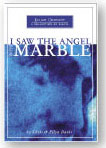
I Saw the Angel in the Marble. When asked how he was able to create such a magnificent sculpture of an angel, Michealangelo replied that he saw the angel in the marble and set him free. This is what we want to so with our children--see the real person inside and set him or her free by developing all that God has gifted each child with. This book is a collection of articles from 15 years of the Elijah Company's catalog and newsletters and represents the best of Chris and Ellyn Davis.
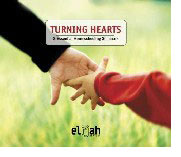 Turning Hearts: The Best of Chris and Ellyn Davis. This set of 8 CDs contains seminars given by Chris and Ellyn Davis of The Elijah Company at home schooling conventions. The set contains all of the favorites that home schoolers ask for over and over. People have told us this set of CDs changed their lives. Find out more about them HERE>> Turning Hearts: The Best of Chris and Ellyn Davis. This set of 8 CDs contains seminars given by Chris and Ellyn Davis of The Elijah Company at home schooling conventions. The set contains all of the favorites that home schoolers ask for over and over. People have told us this set of CDs changed their lives. Find out more about them HERE>>
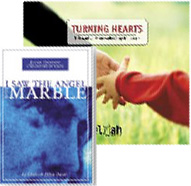 Combination Angel/Davis Seminars Set : both the book and the set of 8 "Turning Hearts" CDs Combination Angel/Davis Seminars Set : both the book and the set of 8 "Turning Hearts" CDs
Building the Home School of Your Dreams. This set of 6 CDs features Chris Davis and Mary Hood and consists of seminars given at a Home School to Home Business Seminar. The sessions cover There is a Bigger Picture by Chris Davis; Moving Away from School at Home; Developing Your Own Scope and Sequence by Chris Davis; Relaxed Home Schooling by Mary Hood; Teaching Elementaries by Mary Hood; and Strategies for High School by Mary Hood.

Books by John Gatto. These books will change the way you think about education. Gatto was a public school teacher for decades and New York's Teacher of the Year, so he has first-hand experience with the effects of public schooling. Not only do his books discuss the major issues about what schooling does to our children, he offers insights into what a true education entails and reflects on our society as a whole and the distorted thinking that leads us to subject our children to an influence that robs them of their creativity and enthusiasm for learning. Gatto's books are "MUST READS." So get these two and read them: Dumbing Us Down and A Different Kind of Teacher
Books by John Holt. Holt's books are wonderfully thought-provoking and give you a real appreciation for the natural learning ability of your children. Read all of these! How Children Learn, Learning All the Time, and Teach Your Own .
Also highly recommended: Guerrilla Learning: How to Give Your Kids a Real Education With or Without School
  Endangered Minds by Jane Healy. Subtitled “Why Children Don't Think and What We Can Do About It,” this is truly a
significant book. The book's premise is that today's children, bombarded by a fast-paced
media culture and with very little interaction with thinking adults, develop different “habits of mind” than children of the past and are therefore unable to tackle the skills involved in learning. Healy clearly explains why our modern lifestyles sabotage
the ability to learn and tells us what to do about it. In the companion book, Your Child's Growing Mind Healy discusses how thinking and learning abilities develop for skills like reading, writing, spelling, proper use of grammar, etc. and what parents can do to create the “mind pathways” that enhance these thinking and learning abilities. These books are "must haves." Endangered Minds by Jane Healy. Subtitled “Why Children Don't Think and What We Can Do About It,” this is truly a
significant book. The book's premise is that today's children, bombarded by a fast-paced
media culture and with very little interaction with thinking adults, develop different “habits of mind” than children of the past and are therefore unable to tackle the skills involved in learning. Healy clearly explains why our modern lifestyles sabotage
the ability to learn and tells us what to do about it. In the companion book, Your Child's Growing Mind Healy discusses how thinking and learning abilities develop for skills like reading, writing, spelling, proper use of grammar, etc. and what parents can do to create the “mind pathways” that enhance these thinking and learning abilities. These books are "must haves."
Resources for choosing teaching materials
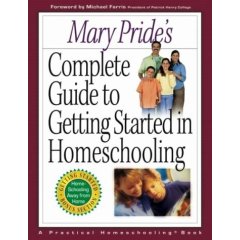 Mary Pride's Complete Guide to Getting Started in Homeschooling. The title can be deceiving, because the book isn't just for those getting started, it's also very helpful to veteran home schoolers who want to re-evaluate what they are doing and the resources that are available to them. Mary Pride's Complete Guide to Getting Started in Homeschooling. The title can be deceiving, because the book isn't just for those getting started, it's also very helpful to veteran home schoolers who want to re-evaluate what they are doing and the resources that are available to them.
Veteran home educators will dive into a vast amounts of up-to-date information with sections on Field Trips, Conferences, Retreats & Homeschool Days for the Whole Family, and Worldview & Leadership Training for Teens. There's also information on how to find everything from contests, to how to write a winning college application essay.
If there were one "top expert" in homeschooling, I would say Mary Pride is it. With her numerous books, Practical Homeschooling Magazine, and website, Mary knows her stuff.
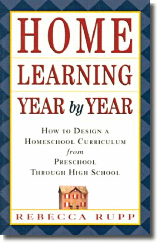 Home Learning Year by Year: How to Design a Homeschool Curriculum from Preschool Through High School by Rebecca Rupp. This book does not come from a Christian orientation, but is one of the few books I know that gives you a checklist of what the traditional pre-K through 12th-grade curriculum expects a child to learn year by year and then tells you how to accomplish the same level of learning at home. Home Learning Year by Year also gives guidelines for the importance of each topic, pointing out which knowledge is essential and which is best for more expansive study based on your child's personal interests. Home Learning Year by Year: How to Design a Homeschool Curriculum from Preschool Through High School by Rebecca Rupp. This book does not come from a Christian orientation, but is one of the few books I know that gives you a checklist of what the traditional pre-K through 12th-grade curriculum expects a child to learn year by year and then tells you how to accomplish the same level of learning at home. Home Learning Year by Year also gives guidelines for the importance of each topic, pointing out which knowledge is essential and which is best for more expansive study based on your child's personal interests.
 Life Skills for Kids by Christine Field is a
guide to equipping your children with the life
skills they will need as adults: people/home
life skills, time/space organization skills,
money management skills, healthy lifestyle
skills, spiritual habits, decision making skills,
creative skills, and celebration skills.
Christine is a home schooling mother herself,
and the book is written in such a way that it
may be used as a reference point and checklist of desired skills
and knowledge to be mastered. Life Skills for Kids by Christine Field is a
guide to equipping your children with the life
skills they will need as adults: people/home
life skills, time/space organization skills,
money management skills, healthy lifestyle
skills, spiritual habits, decision making skills,
creative skills, and celebration skills.
Christine is a home schooling mother herself,
and the book is written in such a way that it
may be used as a reference point and checklist of desired skills
and knowledge to be mastered.
   Homeschooling the Early Years Homeschooling the Early Years
Homeschooling the Middle Years
Homeschooling the Teen Years
Each of these books is a guide to successfully
homeschooling the age group it covers. Starting with
what makes the age group tick, chapters cover the
important aspects of learning, practical ways to approach
each subject area, and the many paths to success.
  What Your Kindergartner Needs to Know What Your Kindergartner Needs to Know
What Your First Grader Needs to Know
What Your Second Grader Needs to Know
What Your Third Grader Needs to Know
What Your Fourth Grader Needs to Know
What Your Fifth Grader Needs to Know
What Your Sixth Grader Needs to Know
This series of books covers what a child at each grade level should be learning in every subject. The books are great to have around to help you design your own curriculum and make sure you aren't leaving any "gaps." History, language arts, science, and several other subjects are covered in enough detail that the book could become your primary textbook for those subjects, but math is summarized, so further teaching materials may be needed there. As you develop your own "Home School Reference Center" of books you can refer to over and over, these need to have their own place there.
Resources to discover how your child learns best
 Find out what your child's learning style is! Developed by the authors of Discover Your Child's Learning Style, this is the most powerful and user friendly learning styles inventory in the world and it is NOW ONLINE! A Self-Portrait™ Profile assesses several aspects of learning style, quickly and simply, in language that is easily understood by everyone. These aspects are: Disposition, Modality, Environment, Interests, and Talents. If you want help in understanding what makes your child "tick" and how your can help him or her learn easier and better (or find out more about yourself), take this easy, quick learning styles assessment test. For more about this learning styles assessment test, CLICK HERE>> Find out what your child's learning style is! Developed by the authors of Discover Your Child's Learning Style, this is the most powerful and user friendly learning styles inventory in the world and it is NOW ONLINE! A Self-Portrait™ Profile assesses several aspects of learning style, quickly and simply, in language that is easily understood by everyone. These aspects are: Disposition, Modality, Environment, Interests, and Talents. If you want help in understanding what makes your child "tick" and how your can help him or her learn easier and better (or find out more about yourself), take this easy, quick learning styles assessment test. For more about this learning styles assessment test, CLICK HERE>>
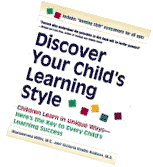 Discover Your Child's Learning Style is a book you need. Period. It has more potential to improve your child's education - and your family relationships - than almost any other book I have ever read. The authors of this book have developed a "Learning Styles Model" of education that helps you discern your child's: Discover Your Child's Learning Style is a book you need. Period. It has more potential to improve your child's education - and your family relationships - than almost any other book I have ever read. The authors of this book have developed a "Learning Styles Model" of education that helps you discern your child's:
• Talents
• Interests
• Preferred learning environment
• Thinking Style
• Modalities
The book includes handy self-tests. Use these to find out just how each child in your family loves to learn... and what teaching approaches help or hinder his learning style. What a huge difference this will make in your homeschool... and in your family relationships!
 Discover Your Children's Gifts will help you uncover your children's natural giftings and personality traits. It helps explain why their personality "quirks" are really evidences of their own God-given gifts. The theological foundation is very sound, making good sense of the main passages on spiritual gifts in a way very few others do. Gifts are broken into 1) Manifestation (sign gifts - 1 Cor 12-14; Acts 2) 2) Ministry (equipping gifts - Eph 4) & 3) Motivational (every-Christian-gifts - Rom 12). Discover Your Children's Gifts will help you uncover your children's natural giftings and personality traits. It helps explain why their personality "quirks" are really evidences of their own God-given gifts. The theological foundation is very sound, making good sense of the main passages on spiritual gifts in a way very few others do. Gifts are broken into 1) Manifestation (sign gifts - 1 Cor 12-14; Acts 2) 2) Ministry (equipping gifts - Eph 4) & 3) Motivational (every-Christian-gifts - Rom 12).
 Dreamers, Discoverers and Dynamos. Every now and then a book comes along that fills in so many gaps in my understanding that I want to tell everyone about it. Dr. Pallodino suggests that one in five children is an "Edison Trait child," meaning he or she has one or more of the following: dazzling intelligence, an active imagination, a free-spirited approach to life, and the ability to frustrate the you-know-what out of others. The heart of the issue is that these children think divergently, while schools generally reward convergent thinking. This book discusses the different types of approaches to life your children may have (dreamer, discover, or dynamo) and how you can most help each type succeed. Dreamers, Discoverers and Dynamos. Every now and then a book comes along that fills in so many gaps in my understanding that I want to tell everyone about it. Dr. Pallodino suggests that one in five children is an "Edison Trait child," meaning he or she has one or more of the following: dazzling intelligence, an active imagination, a free-spirited approach to life, and the ability to frustrate the you-know-what out of others. The heart of the issue is that these children think divergently, while schools generally reward convergent thinking. This book discusses the different types of approaches to life your children may have (dreamer, discover, or dynamo) and how you can most help each type succeed.
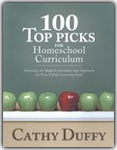 100 Top Picks for Homeschool Curriculum by Cathy Duffy. I've always recommended Cathy's curriculum guides as the best out there for choosing teaching materials that "mesh" with who your family is. Now Cathy guides you through the process, offering her "Top Picks" from each subject area. 100 Top Picks for Homeschool Curriculum by Cathy Duffy. I've always recommended Cathy's curriculum guides as the best out there for choosing teaching materials that "mesh" with who your family is. Now Cathy guides you through the process, offering her "Top Picks" from each subject area.
A major feature of 100 Top Picks is the charts showing the 100 Top Picks in relation to educational approaches, learning styles, and practical features such as prep time needed; design for independent, one-on-one, or group learning; and ease of use for the teacher. Complete reviews of each of the Top Picks provide parents the information they need to make the best choices for each of their children.
The first half of 100 Top Picks covers information that will help you decide your child's learning styles, help you decide what your "Philosophy of Education" is, and help you figure what to teach when. The second half has reviews for all 100 of the top picks. You will gain a lot of insight into what curriculum is available by reading these reviews. She even tosses some extra "Picks" here and there that would've made the list if her book's title was "200 Top Picks".
Resources for each of the different Teaching Approaches
Key resources for the different teaching approaches are found below.
Resources for the Classical Approach
Teaching the Trivium by Laurie and Harvey Bluedorn maintains that the classical style of education is designed to serve Christians well because it was the original model of education that God had in mind for his people to progress from knowledge, to understanding, to wisdom. This is a great book, for two reasons: (1) it takes the whole of the classical method and roots it soundly in the Bible, and (2) it lays out many options for a classical, biblically based course of study that are not overwhelming to the average family. Even if you never intend to use this approach, the many insights into education are well worth the price of the book.
Classical Education and the Home School by Douglas Wilson and others is a brief but thorough overview of Classical Christian education and the basics of Latin, of Logic, of Rhetoric, and of Christian Worldview thinking from a home school perspective.
 The Well Trained Mind by Jessie Wise and Susan Wise Bauer. Teaching history chronologically; reading great books; learning to speak well; mastering another language; focusing on understanding and thinking skills.... these are the kinds of things that produced some of our most influential scientists, statesmen and leaders in the past. Here is THE reference book for people who choose to blend the best of family-centered, home-based learning with a rigorous quest for academic excellence. The Well Trained Mind by Jessie Wise and Susan Wise Bauer. Teaching history chronologically; reading great books; learning to speak well; mastering another language; focusing on understanding and thinking skills.... these are the kinds of things that produced some of our most influential scientists, statesmen and leaders in the past. Here is THE reference book for people who choose to blend the best of family-centered, home-based learning with a rigorous quest for academic excellence.
 The Well-Educated Mind In this "sequel" to The Well Trained Mind, Bauer and Wise help parents seeking self-education in the classical tradition. The Well-Educated Mind In this "sequel" to The Well Trained Mind, Bauer and Wise help parents seeking self-education in the classical tradition.
The Story of the World, Volume 1; The Story of the World, Volume 2; The Story of the World, Volume 3; The Story of the World, Volume 4; First Language Lessons for the Well-Trained Mind; The Ordinary Parent's Guide to Teaching Reading. These are all teaching materials for elementary ages based on the classical approach presented in The Well Trained Mind.
Resources for the Unit Study Approach
Unit Studies Made Easy by Valerie Bendt shares how anyone can develop unit studies. Cathy Duffy says, “If you have been avoiding unit studies because the work involved sounds overwhelming, this book is for you. This is a do-it-yourself guide for putting together your own unit studies based upon your family's goals and interests.” Many of Valerie's unit studies books are out of print but well worth getting your hands on because she is the best there is at explaining how to create unit studies for your children.
Design-A-Study Guides to History Plus by Kathryn Stout. History is the logical framework to built ongoing unit studies around. This is a complete guide to developing history unit studies for all ages integrating composition, spelling, vocabulary, math, science, music and art.
Resources for the Principle Approach
Teaching and Learning America's Christian History : A Christian Education Guide for the American Christian Home, the American Christian Church, the American Christian School : The Principle Approach by James Rose. This is the big red book that is the encyclopedia of the Principle Approach. It goes into depth about fundamental concepts and suggests beginning steps in the 4R process for each subject area.
Resources for the Living Books Approach
The first three books below are called the “Childlight Trilogy.” They were developed by Childlight, an organization dedicated to making Charlotte Mason’s ideas more well known. They are "must reads" for home school parents.
 For the Children's Sake by Susan Schaeffer Macaulay. If you only read one book about Charlotte Mason's approach, let this be the one. In a wonderfully uplifting way, Mrs. Macaulay shares how education can be “the diet that opens doors for each child to build a relationship with God, other persons, & the universe.” For the Children's Sake by Susan Schaeffer Macaulay. If you only read one book about Charlotte Mason's approach, let this be the one. In a wonderfully uplifting way, Mrs. Macaulay shares how education can be “the diet that opens doors for each child to build a relationship with God, other persons, & the universe.”
 Books Children Love by Edith Wilson is an annotated compilation of “living books” arranged by subject. Books Children Love by Edith Wilson is an annotated compilation of “living books” arranged by subject.
Teaching Children by Diane Lopez. An invaluable guide to what children should know in grades K through 6 with teaching suggestions and reading lists of “living books” for each grade in every subject.
 Educating the Whole Hearted Child by Clay and Sally Clarkson is a guide to using whole books and real life to teach and train children at home. Each chapter focuses on a facet of home centered education. Educating the Whole Hearted Child by Clay and Sally Clarkson is a guide to using whole books and real life to teach and train children at home. Each chapter focuses on a facet of home centered education.

A Charlotte Mason Companion. If you only read two books about Charlotte Mason’s approach, let this be the second. Karen Andreola leads the Charlotte Mason Research Institute and has been responsible for many of Mason’s ideas being introduced to the home schooling community. In this huge, oversized book, she masterfully explains how to adapt Mason’s ideas to the home school.
 A Charlotte Mason Education.
Catherine Levison has collected the key points of Charlotte Mason's methods and presents them in a simple, straightforward way that will allow families to quickly maximize the opportunities of homeschooling. A Charlotte Mason Education.
Catherine Levison has collected the key points of Charlotte Mason's methods and presents them in a simple, straightforward way that will allow families to quickly maximize the opportunities of homeschooling.

More Charlotte Mason Education. "Catherine Levison takes an in-depth journey offering even more ideas for implementing the popular methods of Charlotte Mason into home schooling. In this concise and practical guide, Levison presents the key points of Charlotte Mason's methods as contained in her six-volume series."

Charlotte Mason's Original Homeschooling Series.
This six-volume set is the complete works of Charlotte Mason. It includes over 2400 pages of the finest material ever written on education, child training and parenting.
Resources for the Unschooling Approach

The Unschooling Handbook by Mary Griffith tells how to use the whole world as your child’s classroom. Fun to read, the book is a compilation of input and advice from many families who are unschooling their children.

Homeschooling for Excellence by David and Micki Colfax. The story of California goat farmers whose interesting, encouraging, unorthodox methods of home educating their four adopted sons won the boys scholarships to Harvard and Yale. Contains an outline of the course of study they used.

Christian Unschooling "If you are new to homeschooling - BUY THIS BOOK! It will save you years of frustration and confusion. If you are a veteran homeschooler trying to unschool - BUY THIS BOOK! It will comfort you, inspire you, encourage you, and always be at hand when you need a word of wisdom and an optimistic opinion of what you are trying to do for your children! It will thoroughly explain unschooling to you in an easy-to-understand way!"
And of course, you can't study unschooling without reading books by John Holt, the "father" of unschooling. His books are wonderfully thought-provoking and give you a real appreciation for the natural learning ability of your children. Read all of these! How Children Learn, Learning All the Time, and Teach Your Own .
Also highly recommended: Guerrilla Learning: How to Give Your Kids a Real Education With or Without School
Resources for the Eclectic Approach
The Relaxed Home School by Mary Hood is full of ideas for Christians to home school in a more natural and unstructured way. Mary covers how to teach all of the subjects from elementary ages through high school with an eclectic approach rather than by sticking rigidly to prepackaged curricula.
The Joyful Home Schooler continues Mary Hood’s practical, down-to-earth approach from The Relaxed Home School and shares simple, workable solutions to home schooling in an unstructured way.
Also, see the From Home School to Home Business CD set. In her sessions, Mary explains how to use a relaxed home school approach for all ages.
Any article appearing on this website may be copied or forwarded electronically provided that proper credit is given and that the article is not substantively modified.
No article may appear in whole or in part in a publication sold for profit or as part of any commercial endeavor without the written consent of Home School Marketplace.
© Copyright 2006. Home School Marketplace, 1053 Eldridge Loop, Crossville, TN 38571.
Be sure to sign up for our ejournal!
Sign up below.
View past ejournals HERE>> |






 Endangered Minds
Endangered Minds

 Life Skills for Kids
Life Skills for Kids

 Homeschooling the Early Years
Homeschooling the Early Years
 What Your Kindergartner Needs to Know
What Your Kindergartner Needs to Know Discover Your Child's Learning Style
Discover Your Child's Learning Style Discover Your Children's Gifts
Discover Your Children's Gifts Dreamers, Discoverers and Dynamos.
Dreamers, Discoverers and Dynamos. 100 Top Picks for Homeschool Curriculum
100 Top Picks for Homeschool Curriculum The Well Trained Mind
The Well Trained Mind The Well-Educated Mind
The Well-Educated Mind For the Children's Sake
For the Children's Sake
 Educating the Whole Hearted Child
Educating the Whole Hearted Child
 A Charlotte Mason Education
A Charlotte Mason Education



